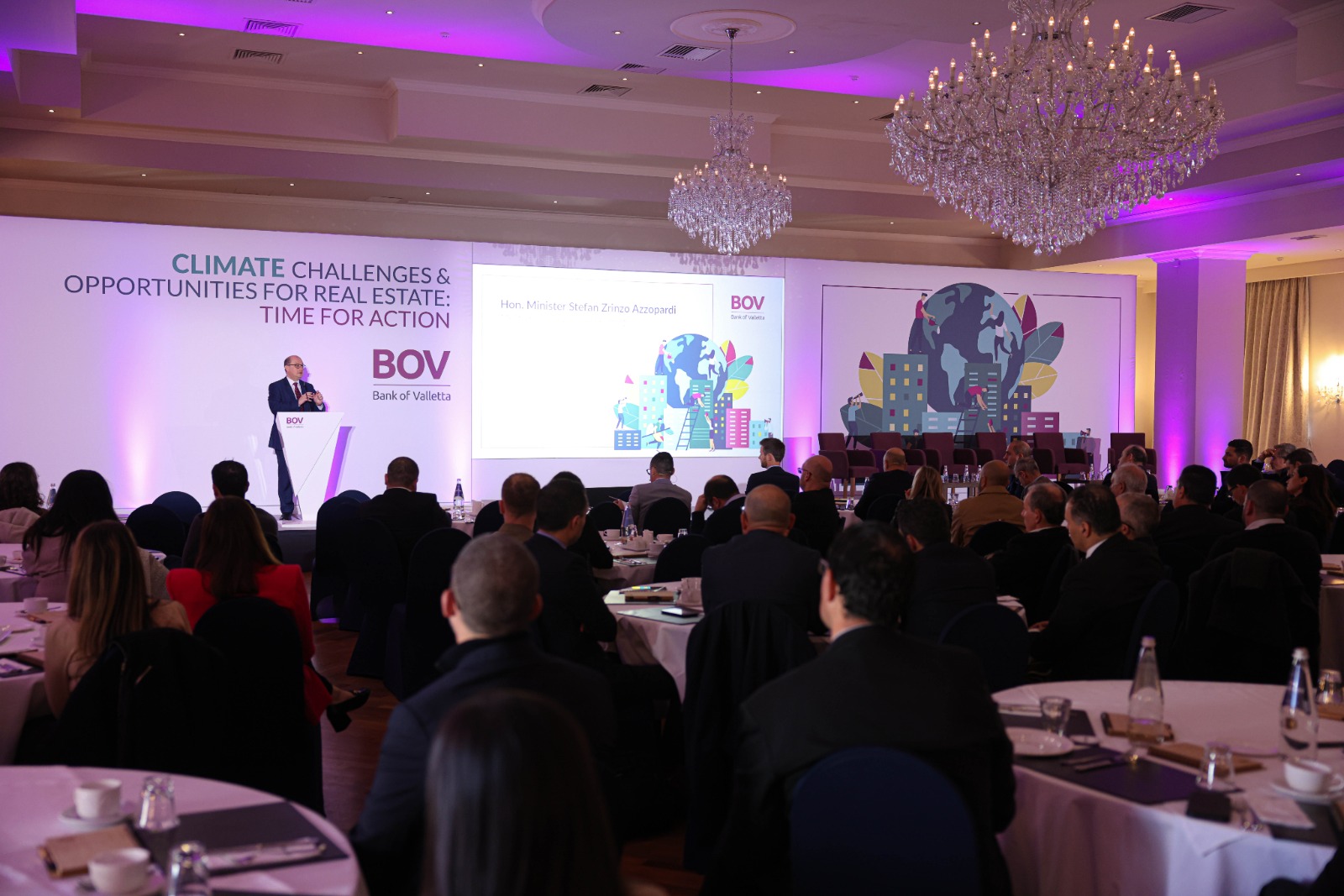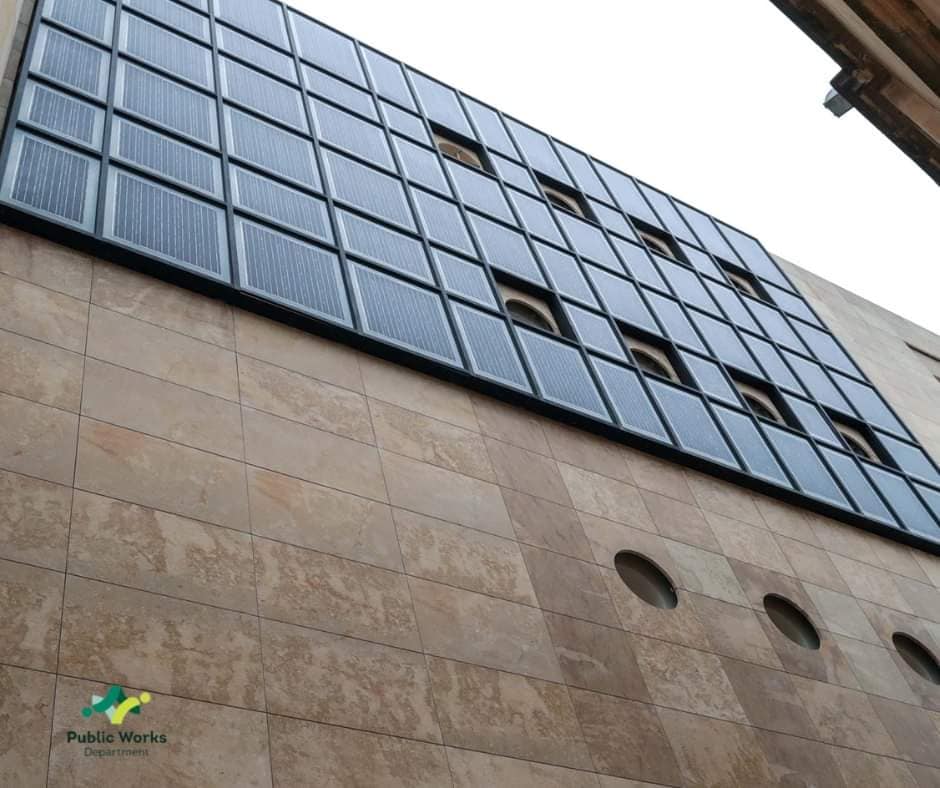Climate Challenges and Opportunities for Real Estate: Time for Action
Bank of Valletta – 24th January 2023
Today’s event was truly an important one. An excellent initiative at the right time. I recall meeting Kenneth Farrugia at the beginning of his tenure as CEO. It is encouraging to see that Bank of Valletta have grasped the importance of energy efficient buildings and are showing their willingness to be an important stakeholder in this change – one that can be postponed no longer. We must upgrade the level of energy efficiency of today’s buildings.
The time to act is now.
This is a change of significant importance for the Maltese Government, the business community and the country as a whole. Now is the time to join forces, with a multitude of stakeholders, but Banks none the least, to drive this change together. It is estimated that only 40% of energy is consumed inside buildings, and buildings are responsible for no less than 36% of greenhouse gas emissions. The buildings that we use could be more energy efficient. The entire building and property sector must evolve and change to address these realities.

Behavioural changes, by building users, developers and building professionals, are needed to achieve action on energy efficiency. Purchasing a property is, from a financial point of view, one of life’s biggest, if not the biggest, commitment. A lot of hard work and sacrifice goes into purchasing a property to make it your home. And whilst building a comfortable home for one’s family needs is everyone’s priority, however, little, if any, thought is put into ensuring that the property purchased is of the highest quality, in terms of materials and building technology used in its construction.
The consumer, unfortunately, is hardly aware of the conditions that he should ask for.
Let’s call a spade by its name: The technologies adopted in the construction of a property is, often, traditional and in various cases leaves much to be desired. This is, often, a reflection, and not the best of reflections, on the key players in this sector: Developers, professionals and contractors. It is high time that investors consider thoroughly the trends in the sale of properties, and also other investment opportunities, while those opting to invest further in the property market are to ensure that they acquaint themselves with the new realities that Climate Change is bringing with it.
There is no doubt that the real estate sector in Malta was, is, and remains one of the most, if not the most, robust sectors of our economy. The property market continues to thrive – despite the global challenges that we are part of. Capital appreciation remains strong, and the cost of purchase is significant. However, the quality aspect remains one which is much to be desired. And in this respect, Banks have a crucial role to play.
It is Banks that finance the absolute majority of property purchases, be they residential or for commercial purposes. It is therefore, pertinent that Banks explain their obligations in relation to the financing of property both to the public in general as well as investors in this sector. Banks need to roll out a clear way forward – call it a roadmap if you wish – on the manner in which they shall observe and adhere to these obligations in evaluating the financing of the property purchases in relation to energy efficiency.

The Energy Performance Certificate that certifies the energy efficiency of each building will gain more importance. Energy efficient properties are in the public interest – and the changes that we would like to see are no excuse, for anybody, or anyone, be they developers, be they banks and other financial institutions, to complicate peoples’ lives and or adopt heavily bureaucratic procedures.
Access to financing for the purchase of a property is a key element to ensure that more people become owners of their homes. I must emphasize, that we cannot simply look at this matter as it was the financing of just another business transaction like any other – for it is not. Developers, on their part, need to up their game to ensure that the financing of property is not hindered as a result of the lack of energy efficient qualities in buildings placed on the market.
It is high time that consumers buying a property know the energy efficiency levels of the property.
Our aim should be to have green and sustainable buildings. This requires radical changes in the way we build but also radical changes in the way we think, act, and behave. We need to create awareness on the part of property purchasers with regard to energy efficiency. This is part of the change required.
In planning new buildings, both private and public, we must seek to speak a new language: the language of renewables, energy efficiency, better insulation of the buildings, reducing heating, cooling, ventilating, applying climate-sensitive design techniques, energy-efficient light sources, and advanced lighting technologies – these must be given primary importance. Energy efficiency not only saves money, and provides a cleaner, healthier environment but it also creates jobs.

Recently, we inaugurated Project House. The head office of the Works Department, known as Projects House in Floriana, underwent a €4 million investment that makes it more energy sustainable. This is in line with Government’s commitment for the de-carbonization of our economy. Government’s commitment is to make Malta an economy that is almost free of emissions. It is a strategy which is central to the development of the economic model of the future – the near future.
The European Union’s Recovery and Resilience Plan provided funds for more energy efficiency in public buildings and commercial buildings. Our target is to reach the 2050 Sustainable Development Goals as declared by the United Nations and we shall lose no time, and effort, in reaching these targets.
Budget 2023 has now extended benefits in relation to the installation of PV panels for residential houses and renovations of private sector buildings. An essential aspect of the evolution that is necessary for the construction and building sector is buildings that are more energy efficient on two levels, the newly built and the retrofitting of older ones. Efforts are underway to update Energy Performance Certificate issued by the Building and Construction Authority to reflect the new requirements.
This change requires a collective effort. It requires that all stakeholders: Government; Banks; Developers and Consumers are on board. This change cannot happen unless there is a collective effort. This change requires a broad discussion whereby all issues are addressed and solutions found – collectively. Banks have a primary role to play – and communicating, clearly, with stake holders and consumers is a must. Let us not look at this change as a bureaucratic process – but one that shall reap benefits for all. Let us, together, walk the talk in both domestic, commercial, and public buildings.
The cost of inaction is too high. We will only succeed once we bring everyone on board. We have to see the present challenges as new opportunities. Let us ensure that this, much needed change, is done in a just and fair manner. For we all stand to gain from energy efficient buildings. Let us all join forces to make this change happen.


